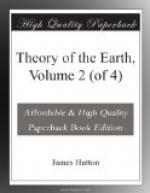It is only in science that any question concerning the origin and end of things is formed; and it is in science only that the resolution of those questions is to be attained. The natural operations of this globe, by which the size and shape of our land are changed, are so slow as to be altogether imperceptible to men who are employed in pursuing the various occupations of life and literature. We must not ask the industrious inhabitant, for the end or origin of this earth: he sees the present, and he looks no farther into the works of time than his experience can supply his reason. We must not ask the statesman, who looks into the history of time past, for the rise and fall of empires; he proceeds upon the idea of a stationary earth, and most justly has respect to nothing but the influence of moral causes.
It is in the philosophy of nature that the natural history of this earth is to be studied; and we must not allow ourselves ever to reason without proper data, or to fabricate a system of apparent wisdom in the folly of a hypothetical delusion.
When, to a scientific view of the subject, we join the proof which has been given, that in all the quarters of the globe, in every place upon the surface of the earth, there are the most undoubted marks of the continued progress of those operations which wear away and waste the land, both in its height and width, its elevation and extention, and that for a space of duration in which our measures of time are lost, we must sit down contented with this limitation of our retrospect, as well as prospect, and acknowledge, that it is in vain to seek for any computation of the time, during which the materials of this earth had been prepared in a preceding world, and collected at the bottom of a former sea.
The system of this earth will thus appear to comprehend many different operations, or it exhibits various powers co-operating for the production of those appearances which we properly understand in knowing causes. Thus, in order to understand the natural conformation of this country, or the particular shape of any other place upon the globe, it is not enough to see the effects of those powers which gradually waste and wear away the surface, we must also see how those powers affecting the surface operate, or by what principle they act.
Besides, seeing those powers which are employed in thus changing the surface of the earth, we must also observe how their force is naturally augmented with the declivity of the ground on which they operate. Neither is it sufficient to understand by what powers the surface is impaired, for, it may be asked, why, in equal circumstances, one part is more impaired than another; this then leads to the examination of the mineral system, in which are determined the hardness and solidity, consequently, the permanency of those bodies of which our land is composed; and here are sources of indefinite variety.




